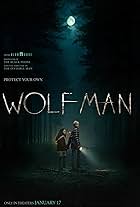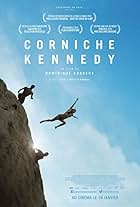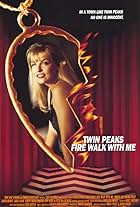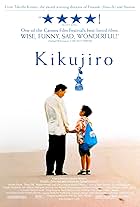
Giuseppe_Silecchia
Joined Feb 2024
Welcome to the new profile
We're still working on updating some profile features. To see the badges, ratings breakdowns, and polls for this profile, please go to the previous version.
Ratings347
Giuseppe_Silecchia's rating
Reviews344
Giuseppe_Silecchia's rating
Wolf Man (2025), directed by Leigh Whannell, presents a familiar yet chilling premise: a man must protect his family from a deadly werewolf while grappling with his own transformation. Set in a remote farmhouse, the family is stalked by an unseen force during a full moon, leading to a nightmarish struggle for survival. However, as the tension builds, the father, played by Leigh Whannell, starts to undergo a disturbing transformation, further blurring the lines between man and monster.
The concept of a family trapped by an unseen predator is undeniably suspenseful, and the film does a good job of building an eerie atmosphere. Whannell, known for his work in horror, brings his signature tension and dread to the film's tone, keeping the audience on edge. The performances from the cast, particularly Julia Garner and Christopher Abbott, are solid, with Garner portraying a woman caught between fear for her family and the horror of her husband's transformation. However, it's Whannell's performance as the father that carries much of the emotional weight, even as his character's transformation becomes central to the plot.
The film's visual style is effective in creating a sense of claustrophobia and dread. The isolation of the farmhouse setting works well, and the cinematography uses shadow and darkness to enhance the sense of danger lurking just out of sight. The slow build-up of tension as the family waits for the threat to materialize, paired with the increasing transformation of the father, offers potential for a truly terrifying experience.
Unfortunately, while the atmosphere and performances are strong, Wolf Man falters in its execution. The pacing feels uneven, with some moments dragging on too long without significant developments, while others are rushed. The transformation scenes, which should have been central to the horror, are underwhelming and lack the visceral impact one might expect from a werewolf film. Additionally, the narrative doesn't quite live up to the potential of its premise, leaving some viewers yearning for more depth and substance.
Despite its strong concept, Wolf Man doesn't fully deliver on its promise. It's a film that holds moments of suspense and unease, but ultimately, it struggles to make a lasting impact. For those looking for a creature feature with more emotional depth or horror, this might leave you wanting more.
Rating: 5/10. A chilling idea marred by pacing issues and underwhelming execution, leaving the film stuck in the shadows of better werewolf tales.
The concept of a family trapped by an unseen predator is undeniably suspenseful, and the film does a good job of building an eerie atmosphere. Whannell, known for his work in horror, brings his signature tension and dread to the film's tone, keeping the audience on edge. The performances from the cast, particularly Julia Garner and Christopher Abbott, are solid, with Garner portraying a woman caught between fear for her family and the horror of her husband's transformation. However, it's Whannell's performance as the father that carries much of the emotional weight, even as his character's transformation becomes central to the plot.
The film's visual style is effective in creating a sense of claustrophobia and dread. The isolation of the farmhouse setting works well, and the cinematography uses shadow and darkness to enhance the sense of danger lurking just out of sight. The slow build-up of tension as the family waits for the threat to materialize, paired with the increasing transformation of the father, offers potential for a truly terrifying experience.
Unfortunately, while the atmosphere and performances are strong, Wolf Man falters in its execution. The pacing feels uneven, with some moments dragging on too long without significant developments, while others are rushed. The transformation scenes, which should have been central to the horror, are underwhelming and lack the visceral impact one might expect from a werewolf film. Additionally, the narrative doesn't quite live up to the potential of its premise, leaving some viewers yearning for more depth and substance.
Despite its strong concept, Wolf Man doesn't fully deliver on its promise. It's a film that holds moments of suspense and unease, but ultimately, it struggles to make a lasting impact. For those looking for a creature feature with more emotional depth or horror, this might leave you wanting more.
Rating: 5/10. A chilling idea marred by pacing issues and underwhelming execution, leaving the film stuck in the shadows of better werewolf tales.
The Interval (2012), directed by Leonardo Di Costanzo, is a gripping drama that unfolds in the outskirts of Naples, where a sixteen-year-old girl named Veronica becomes a hostage after an offense to a local Camorra boss's neighborhood. As Veronica waits in an abandoned building for her punishment, she is guarded by Salvatore, a timid, fearful man, whose own struggles unfold as the film progresses. The film is a tense exploration of power, vulnerability, and the emotional dynamics between two individuals trapped in a dangerous situation.
The film excels in creating an atmosphere of claustrophobic tension, with the abandoned building acting as a metaphor for the characters' emotional confinement. Di Costanzo expertly builds suspense through slow pacing, allowing the viewer to feel the weight of the passing hours. The quiet nature of the film contrasts with the looming threat of violence, highlighting the sense of fear and helplessness that both Veronica and Salvatore experience.
Salvatore Ruocco's portrayal of Salvatore is subtle yet powerful. His performance captures the internal conflict of a man who, despite his fear and reluctance, finds himself caught in a situation he cannot escape. Francesca Riso, playing Veronica, brings a strong sense of defiance and vulnerability to her role, portraying a young woman who is both a victim of circumstance and a survivor in a world governed by fear and power.
The Interval's greatest strength lies in its ability to delve deep into the psychology of its characters. The film is not just a thriller, but a profound exploration of human emotions under extreme pressure. The quiet moments between Veronica and Salvatore are just as intense as the moments of danger, with both characters confronting their own fears and limitations.
The film does a great job of portraying the oppressive environment of Naples, using its setting not just as a backdrop, but as a character in itself. The film's pacing, however, may not appeal to all viewers, as it is deliberately slow, reflecting the tension of the situation but also leaving some moments feeling drawn out.
While The Interval may not have the broad appeal of more mainstream thrillers, it offers a powerful, emotionally charged experience that sticks with the viewer long after the credits roll. It's a quiet, contemplative film that uses its minimalism to great effect.
Rating: 8/10. A haunting and introspective thriller that captures the fear, power, and vulnerability of its characters in a tense and emotionally resonant narrative.
The film excels in creating an atmosphere of claustrophobic tension, with the abandoned building acting as a metaphor for the characters' emotional confinement. Di Costanzo expertly builds suspense through slow pacing, allowing the viewer to feel the weight of the passing hours. The quiet nature of the film contrasts with the looming threat of violence, highlighting the sense of fear and helplessness that both Veronica and Salvatore experience.
Salvatore Ruocco's portrayal of Salvatore is subtle yet powerful. His performance captures the internal conflict of a man who, despite his fear and reluctance, finds himself caught in a situation he cannot escape. Francesca Riso, playing Veronica, brings a strong sense of defiance and vulnerability to her role, portraying a young woman who is both a victim of circumstance and a survivor in a world governed by fear and power.
The Interval's greatest strength lies in its ability to delve deep into the psychology of its characters. The film is not just a thriller, but a profound exploration of human emotions under extreme pressure. The quiet moments between Veronica and Salvatore are just as intense as the moments of danger, with both characters confronting their own fears and limitations.
The film does a great job of portraying the oppressive environment of Naples, using its setting not just as a backdrop, but as a character in itself. The film's pacing, however, may not appeal to all viewers, as it is deliberately slow, reflecting the tension of the situation but also leaving some moments feeling drawn out.
While The Interval may not have the broad appeal of more mainstream thrillers, it offers a powerful, emotionally charged experience that sticks with the viewer long after the credits roll. It's a quiet, contemplative film that uses its minimalism to great effect.
Rating: 8/10. A haunting and introspective thriller that captures the fear, power, and vulnerability of its characters in a tense and emotionally resonant narrative.
Corniche Kennedy (2016), directed by Dominique Cabrera, tells the story of a group of teenagers in Marseille who, while enjoying their carefree summer at the beach, become entangled in a drugs trafficking operation, leading to a police investigation. The film explores themes of youth, rebellion, and the consequences of choices, but it struggles to dive deep into the emotional complexities of its characters.
The film has an authentic, gritty portrayal of youth living in the shadow of poverty and crime. The beach setting of Marseille serves as a backdrop for the characters' adventures, and the cinematography does a great job of capturing the beauty of the surroundings while also highlighting the darker, more dangerous elements of their world. It's a world where carefree days are overshadowed by the looming threat of law enforcement and criminal activity.
The performances of the cast, especially Aïssa Maïga and Lola Créton, are competent, and they do well to convey.
The film has an authentic, gritty portrayal of youth living in the shadow of poverty and crime. The beach setting of Marseille serves as a backdrop for the characters' adventures, and the cinematography does a great job of capturing the beauty of the surroundings while also highlighting the darker, more dangerous elements of their world. It's a world where carefree days are overshadowed by the looming threat of law enforcement and criminal activity.
The performances of the cast, especially Aïssa Maïga and Lola Créton, are competent, and they do well to convey.
























